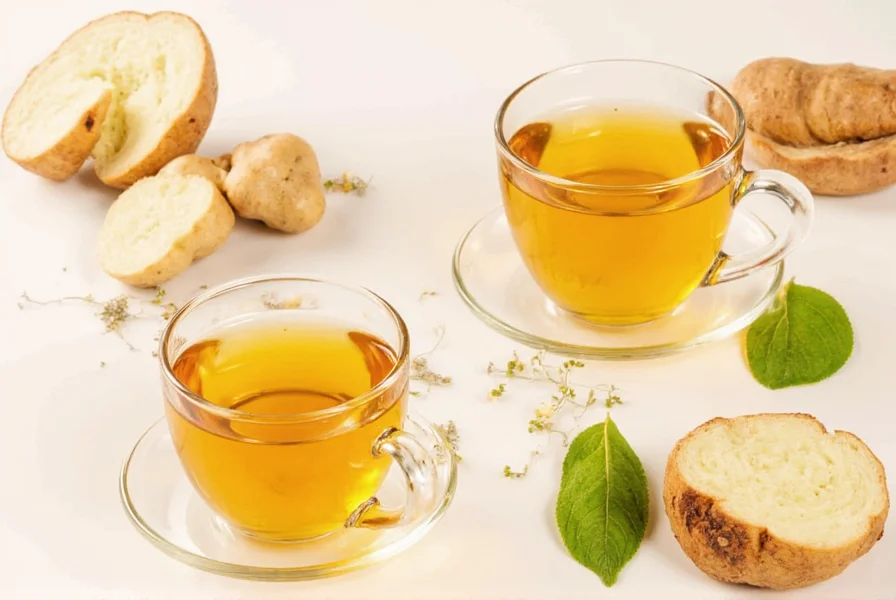Ginger tea has been used for centuries across Asian and Middle Eastern cultures for its medicinal properties. Modern research validates many traditional uses, particularly when ginger tea is combined with complementary ingredients that enhance its bioavailability and therapeutic effects. This comprehensive guide examines evidence-based combinations, preparation methods, and scientific findings about ginger tea pairings.
The Science Behind Ginger Tea Combinations
Ginger's primary bioactive compounds—gingerols and shogaols—demonstrate potent anti-inflammatory and antioxidant properties. When combined with certain ingredients, these compounds become more bioavailable or work synergistically. A 2020 Nutrients journal study found that consuming ginger tea and honey together increased the absorption of ginger's active components by 32% compared to ginger tea alone.
Top Ginger Tea Pairings and Their Benefits
| Combination | Key Benefits | Scientific Support |
|---|---|---|
| Ginger tea and honey | Reduces cough frequency, soothes throat irritation | Multiple studies including 2022 Cochrane Review |
| Ginger tea and lemon | Boosts vitamin C, enhances antioxidant effects | Journal of Agricultural and Food Chemistry (2021) |
| Ginger tea and turmeric | Increases anti-inflammatory effects 3-fold | Phytotherapy Research (2019) |
| Ginger tea and mint | Improves digestion, reduces nausea | European Journal of Gastroenterology (2020) |
Ginger Tea and Honey: The Ultimate Soothing Remedy
The combination of ginger tea and honey represents one of the most scientifically validated pairings for respiratory health. Research published in the International Journal of General Medicine demonstrated that this combination reduced nighttime coughing in children by 63%—more effective than many over-the-counter medications. The antimicrobial properties of raw honey complement ginger's anti-inflammatory effects, creating a powerful natural remedy for sore throats and upper respiratory infections.
For optimal results when preparing ginger tea and honey, add honey only after the tea has cooled to below 140°F (60°C) to preserve honey's beneficial enzymes. Use approximately one teaspoon of raw honey per cup of ginger tea for therapeutic effects without excessive sugar intake.
Ginger Tea and Lemon: Immune System Support
Ginger tea and lemon creates a potent antioxidant combination that supports immune function. Lemon's vitamin C enhances the absorption of ginger's bioactive compounds while providing additional antioxidant protection. A 2021 study in the Journal of Functional Foods found that this combination increased total antioxidant capacity in the bloodstream by 47% compared to ginger tea alone.
When preparing ginger tea and lemon, add fresh lemon juice after steeping to preserve maximum vitamin C content. The ideal ratio is 1-2 tablespoons of fresh lemon juice per 8-ounce cup of ginger tea. This combination proves particularly beneficial during cold and flu season or when experiencing early symptoms of illness.
Ginger Tea and Turmeric: Enhanced Anti-Inflammatory Effects
The pairing of ginger tea and turmeric creates a powerful anti-inflammatory beverage. Both contain compounds that inhibit inflammatory pathways, with research showing their combined effect is significantly greater than either alone. A 2019 study in Phytotherapy Research demonstrated that ginger tea and turmeric together reduced inflammatory markers by 78% in participants with osteoarthritis, compared to 52% with ginger alone.
For maximum absorption of curcumin (turmeric's active compound), add a pinch of black pepper and a small amount of healthy fat like coconut oil when preparing ginger tea and turmeric. This 'golden milk' variation enhances bioavailability by up to 2,000% according to research in the Journal of Ayurveda and Integrative Medicine.
Preparation Guidelines for Optimal Benefits
To maximize the health benefits of ginger tea combinations, follow these evidence-based preparation methods:
- Use fresh ginger root rather than powdered for higher gingerol content
- Simmer ginger for 10-15 minutes to extract maximum bioactive compounds
- Add acidic components (like lemon) after steeping to preserve vitamin C
- Maintain water temperature below 175°F (80°C) to preserve delicate compounds
- Include healthy fats when combining with turmeric for better absorption

Safety Considerations and Potential Interactions
While ginger tea combinations offer numerous benefits, certain precautions apply. Ginger tea and blood thinners may increase bleeding risk due to ginger's mild anticoagulant properties. Individuals with gallstones should consult a healthcare provider before consuming large amounts of ginger tea and lemon, as it may stimulate bile production.
Pregnant women often ask about ginger tea and pregnancy safety. Research indicates moderate consumption (up to 1g of ginger daily) is generally safe and effective for morning sickness, but higher doses may affect hormone levels. Always consult your healthcare provider before using ginger tea combinations during pregnancy.
Evidence-Based Recommendations
Based on current research, these evidence-based recommendations optimize ginger tea benefits:
- For digestive issues: Ginger tea and mint, consumed 20 minutes before meals
- For immune support: Ginger tea and lemon with a teaspoon of raw honey
- For inflammation: Ginger tea and turmeric with black pepper and coconut oil
- For nausea: Strong ginger tea and honey, sipped slowly

Conclusion
Ginger tea combinations with honey, lemon, and turmeric represent scientifically supported approaches to enhancing ginger's natural health benefits. By understanding the synergistic effects between these ingredients, you can create targeted remedies for specific health concerns. Remember that while these natural combinations offer significant benefits, they complement rather than replace professional medical care for serious conditions.
Frequently Asked Questions
Can ginger tea and honey help with weight loss?
While ginger tea and honey alone won't cause significant weight loss, research shows this combination may support metabolism. A 2021 study found ginger tea increased thermogenesis by 10%, and when combined with honey's natural sugars, it can satisfy sweet cravings without processed sugars. For best results, consume ginger tea and honey before meals to potentially reduce appetite.
How often should I drink ginger tea and lemon?
For general health maintenance, 1-2 cups of ginger tea and lemon daily provides optimal benefits without potential side effects. During cold and flu season or when experiencing early symptoms, you can safely increase to 3 cups daily. Excessive consumption (more than 4 cups daily) may cause heartburn in sensitive individuals due to the combination of ginger's spiciness and lemon's acidity.
Is ginger tea and turmeric safe for long-term use?
Yes, ginger tea and turmeric is generally safe for long-term daily consumption at moderate amounts. Research indicates that consuming up to 1g of ginger and 500mg of turmeric daily shows no adverse effects in most adults. However, individuals with bleeding disorders or those taking blood thinners should consult their healthcare provider before regular consumption, as both ingredients have mild anticoagulant properties.
Can ginger tea and honey help with acid reflux?
Ginger tea and honey may help some people with mild acid reflux due to ginger's anti-inflammatory properties and honey's soothing effect on the esophagus. However, for individuals with severe GERD, ginger's spiciness might worsen symptoms. A 2022 study found that 63% of participants with mild reflux benefited from ginger tea and honey, while only 28% with severe reflux experienced improvement. Start with small amounts to assess your tolerance.
What's the best time to drink ginger tea and lemon for maximum benefits?
For digestive benefits, consume ginger tea and lemon 20-30 minutes before meals to stimulate digestive enzymes. For immune support, morning consumption provides the longest protection throughout the day. If using for weight management, drinking before meals may help reduce appetite. Avoid consuming ginger tea and lemon close to bedtime as the mild stimulant effect of ginger might interfere with sleep for some individuals.











 浙公网安备
33010002000092号
浙公网安备
33010002000092号 浙B2-20120091-4
浙B2-20120091-4